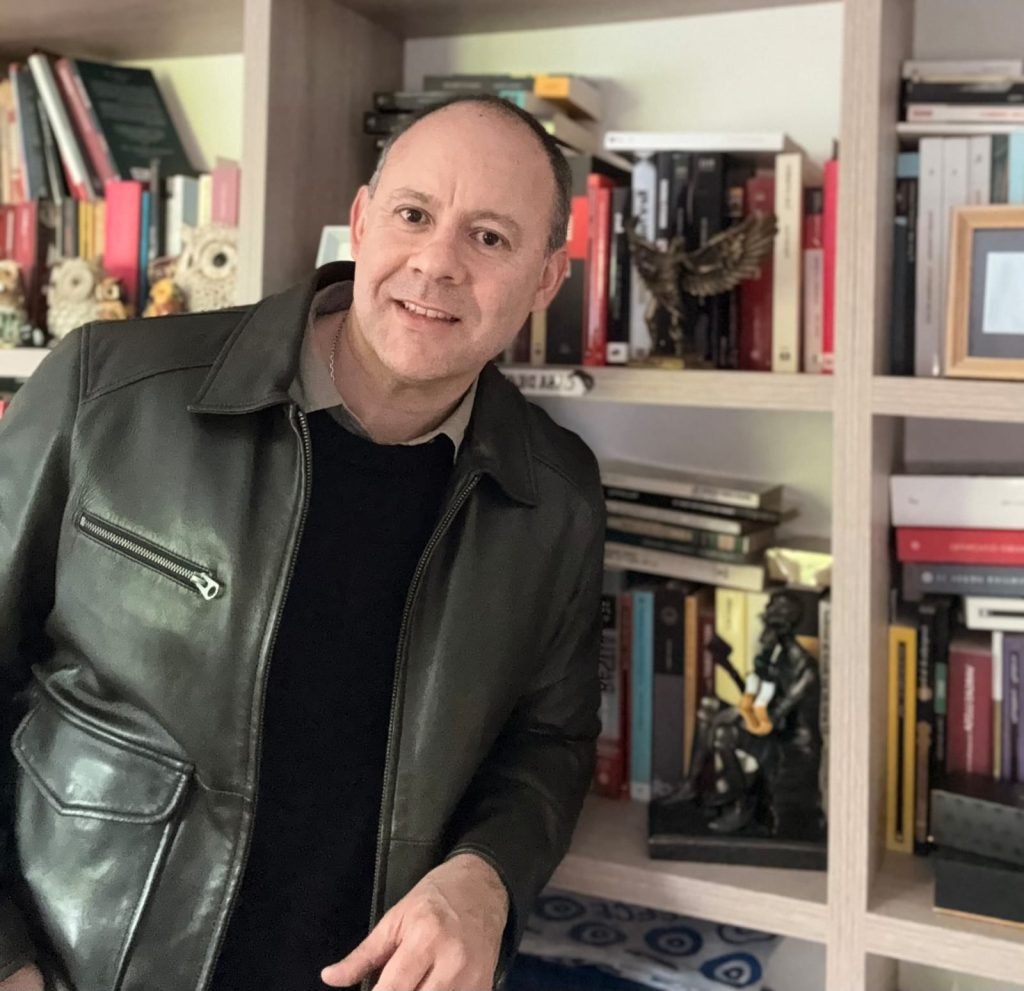Original article: Entrevista a Gonzalo Garay por su nuevo libro “La música de los domingos por la tarde”: Un espejo que refleja la oscuridad humana
By Mariana Hales
Author and former judge Gonzalo Garay Burnás introduces his latest novel, «The Music of Sunday Afternoons,» a dark, intimate, and provocative work that delves into the fringes of morality, madness, and redemption.
Written in the first person by Nicolás, a young Chilean writer, the narrative unfolds between Paris and Concepción, exploring the obsessive relationship between the protagonist and his enigmatic mentor, Bastián—a man as charismatic as he is unsettling.
With this new novel, Garay—known for works like «Author’s Kitchen,» «Candy, Candy, Candy,» and «The Lives of Others»—solidifies a visceral and contemporary narrative style that boldly showcases the uncomfortable aspects of desire, guilt, and artistic creation. His writing, characterized by a tension between the poetic and the stark, prompts reflection on human fragility and the quest for meaning amidst chaos.
In this interview with El Ciudadano, Gonzalo Garay Burnás discusses the motivations behind his new book, the intricate characterizations of Bastián and Nicolás, and that «internal music» which he believes guides every act of writing.
«The Music of Sunday Afternoons» explores the fringes of morality, madness, and redemption through writing. What personal or literary motivations led you to write such a dark and intimate story?
I felt the need to continue exploring the universe of Bastián and Nicolás, which first appeared in my novel Author’s Kitchen and evolved further in my next book: Candy, Candy, Candy. This new book relates to that internal music functioning as a machine of ideas, decoding everyday observations that nourish my writing.
I haven’t drawn personal motivations for this story; I’ve already explored my autobiographical journey in The Greek and The Lives of Others. That groundwork was sufficient. This book is a literary exercise aimed at placing Bastián and Nicolás in varied settings, delving into their horrors and what moves and obsesses them. It had to be dark because both characters share that trait, there was no other option. Still, I believe there’s space for humor, satire, and wit. It’s a novel of our times—raw and tough, reflecting current realities. I couldn’t write from any other place; reality is as it is, regardless of individual perception or idealization.
Nicolás is a writer, and I found that profession an excellent vehicle for exploring moral dilemmas and madness, which isn’t new. What is different lies in the narrative style, the perspective, and the settings. Writers are in a perpetual search; that’s what each new book is about—discoveries, questioning why we write and the essence of the literary journey.
Every book acts like a revelation, shedding a new layer of truth that connects deeply with themes of madness and morality. Quoting my friend and writer Luis Nitrihual, I believe The Music of Sunday Afternoons tries to answer the following questions: Who said that speaking your truth is good for your health? Who can believe that being a writer is the best job in the world? Only those who are not.
Bastián’s character, with his blend of charisma and psychopathy, creates a dangerous fascination for Nicolás. How did you construct this disturbing figure, and what role does he play in the protagonist’s inner journey?
Bastián Richter is a mystery, even to me. He serves as a metaphor for art and success, highlighting how these concepts can coexist with deception disguised as pleasure. There’s a play with aesthetic questions and the decadent cycle of empty lives needing external stimuli to engage with the dynamics surrounding them. Food subtly weaves into the story, protecting Bastián from the truth, allowing him to sidestep it.
If I told you how I wrote him, I’d be lying; I’m not entirely sure. The character has always been quite independent since I wrote Author’s Kitchen; I never intended to control him. I freed him to carve out his own path, regardless of the rejection I’d sometimes feel. Bastián serves as a reference point for Nicolás—a solitary man who seems to know it all; strong, successful, captivating. He represents the destination Nicolás aspires to, but one he knows he can never attain, hence the character’s contradictions. Bastián even exerts dominion in his absence, instilling fear in Nicolás, which ignites an emotional torrent leading him to idolize and abhor his mentor simultaneously. Even after Bastián’s death, Nicolás tries to decipher him.
Fire emerges as a central symbol in the novel, linked to both crime and redemption. What does fire represent to you, from a narrative or personal perspective?
Anyone who tries to erase the past with flames is mistaken; fire never consumes everything—it always leaves something behind: a clue, evidence, an expression of intent, the spirit of the perpetrator. Fire made its way into the text because reality feels ablaze to me, beyond what I can observe here in Temuco and its surroundings, where some believe they control everything with a match and some gasoline. The protagonist of The Music of Sunday Afternoons shares this distorted perception.
Fire symbolizes passion, a vital impulse, the spark that can ignite creativity but can also obscure it if not handled properly. Fire carries an internal heat demanding that one transform into words what resonates within—that burning music one must liberate oneself from. Fire is also memory, much like a torch passed down through generations, keeping something alive even in uncertain moments.
To what extent is Nicolás an alter ego of yours, or is he a completely autonomous literary creation?
There’s always a piece of the author in every book, although I don’t feel closely related to Nicolás at all. Nicolás is an independent creation who has accompanied me for quite some time, perhaps too long. I still remember the settings he inhabits, the scent of his deserted home, the views from his study window looking out onto Concepción—the literary city which inspires me. We coexisted for a long time, I dreamed of him, we breathed the same air. I had to let him go because he was consuming me. I needed time for myself. I hope he won’t interfere with my next story.
How would you define this novel in a few words? If you had to describe it with three adjectives, what would they be and why?
The Music of Sunday Afternoons is soft nostalgia, as it marks the end of a phase, an era, and a day, heralding the return of the everyday. It’s perhaps a breath between what has been and what is to come, a melody that interlaces melancholy and tension: Sunday afternoon carries a tone of farewell, almost musical, that is not complete sadness, but rather a light shadow.
What do you believe differentiates «The Music of Sunday Afternoons» from your previous works? How does your style differ or intensify here?
There’s a proposal for metanarrative; I believe this sets it apart from my earlier works. In my constant pursuit of refreshing my narrative and engaging in a different game, you’ll find a story that doesn’t aim to soften the facts, delving into family dynamics: the journey of an only child after their parents’ death or the position a humble fraudster takes when they finally feel successful in a world that now accepts them. Personal stories shape the characters’ futures, anchoring them to a bastion from which they cannot escape without getting hurt. The quest for success, if such a thing exists, offers incredibly twisted variables. There’s something of this in this book, along with elements of blood and fire. I can’t renounce the visceral tone of my works; I write as I live.
How do you hope this novel will impact readers? What emotions or reflections do you think it may evoke?
I always hope for a dialogue to emerge with every reading, that readers create their own story based on the book’s scenes. The writing circuit reaches its closure with readers, thereafter embarking on its own journey. I hope it brings them pleasure and entertains them—that they embrace Nicolás and make him their own, that they take him from me and keep him with them. They would do me a great favor.

Interview by Mariana Hales



